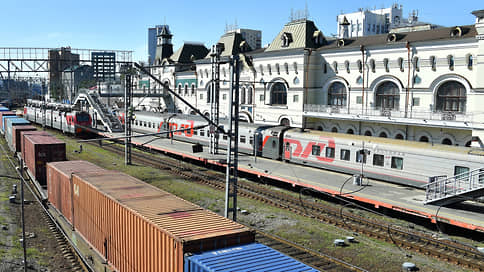Containers went under everything – Kommersant
[ad_1]

Container traffic by rail rose nearly 20% in April. The fastest growth is in the transportation of cars and components, machine tools and engines, where European deliveries by road have been replaced by containers from Asia and the Middle East. The transportation of fertilizers is also increasing due to the significant volumes of Belarusian transit. According to experts, container traffic will continue to grow as the circle of partner countries narrows, from which goods can be shipped by alternative means.
Transportation of containers on the network of Russian Railways increased sharply in April – by 19.7%, exceeding 600 thousand TEU. In four months, 2.35 million TEU were transported, 8.5% more than a year earlier. In particular, domestic transportation grew by 9% (911 thousand TEU), by 21% – import (638 thousand TEU), by 8% – export (535 thousand TEU). Only transit significantly decreased (by 14%, to 243 thousand TEU), follows from the materials of Russian Railways.
IPEM Deputy General Director Vladimir Savchuk notes that 6 p.p. of April growth is associated with a low base in April 2022, in which there was a decrease in traffic compared to March due to the start of the withdrawal of foreign container lines under the influence of sanctions. Imports in containers increased by 48% in April, he notes. In imports, high growth was recorded in the segment of container transportation of cars and components for them – by 95% in April and by 49.8% in January-April. The transportation of chemical and mineral fertilizers in containers increased by 148% in April, and by 240.2% in January-April, Mr. Savchuk notes: “The main trend was the growth in transit transportation of Belarusian fertilizers.” The intensification of the program for the development of mechanical engineering and the growth in the load of Russian enterprises led to the intensification of the transportation of machine tools and engines by 32%, he says.
The head of Infoline-Analytics, Mikhail Burmistrov, adds that Europe used to be the main counterparty for engineering products, from which these goods were transported mainly by road, and now they come from the main counterparty countries in containers by sea and rail. “Difficulties with access to the infrastructure in traditional types of wagons led to the transfer of part of the oil products to specialized containers (an increase of 58% in April), notes Volodymyr Savchuk. problematic.”
In “TransContainer” “Kommersant” confirmed the growth of loaded traffic in April at the level of 20%. “In particular, the transportation of mineral fertilizers and raw materials for their production, various equipment, grain legumes, seeds, fruits, mineral building materials was actively increasing,” they said. “The transportation of ferrous scrap products and cement was decreasing.” In May, growth trends continue, they say in TransContainer: the growth of loaded traffic is above 30%, taking into account empty traffic – more than 25%.
Mikhail Burmistrov says that Russia’s main trading partners now are China, Turkey and the United Arab Emirates, and their very geographical position determines mainly the container delivery of goods. As supplies from the UAE and Turkey are curtailed due to sanctions, the country will become increasingly dependent on China, which will also lead to further growth in container traffic. They are held back, in his opinion, by the difficult situation with dispatching on the railway network, restrictions on sending empty platforms to ports, as well as failures in the IT infrastructure – such as, for example, the recent failure in the work of customs (see “Kommersant” dated April 11) . The most difficult situation now is in the ports of southern Russia. But in general, container logistics is a “golden time,” he says: a lot needs to be transported, new directions are opening up, globally there is container equipment, and there are enough platforms, the cost of shipping containers from China has noticeably decreased. In general, he concludes, now all players in the container market are striving for a comprehensive service and are no longer just providing platforms, but also assembling container trains and even starting to put container ships on sea lines, due to which, in particular, there is a noticeable revival in the ports of St. Petersburg.
[ad_2]
Source link





